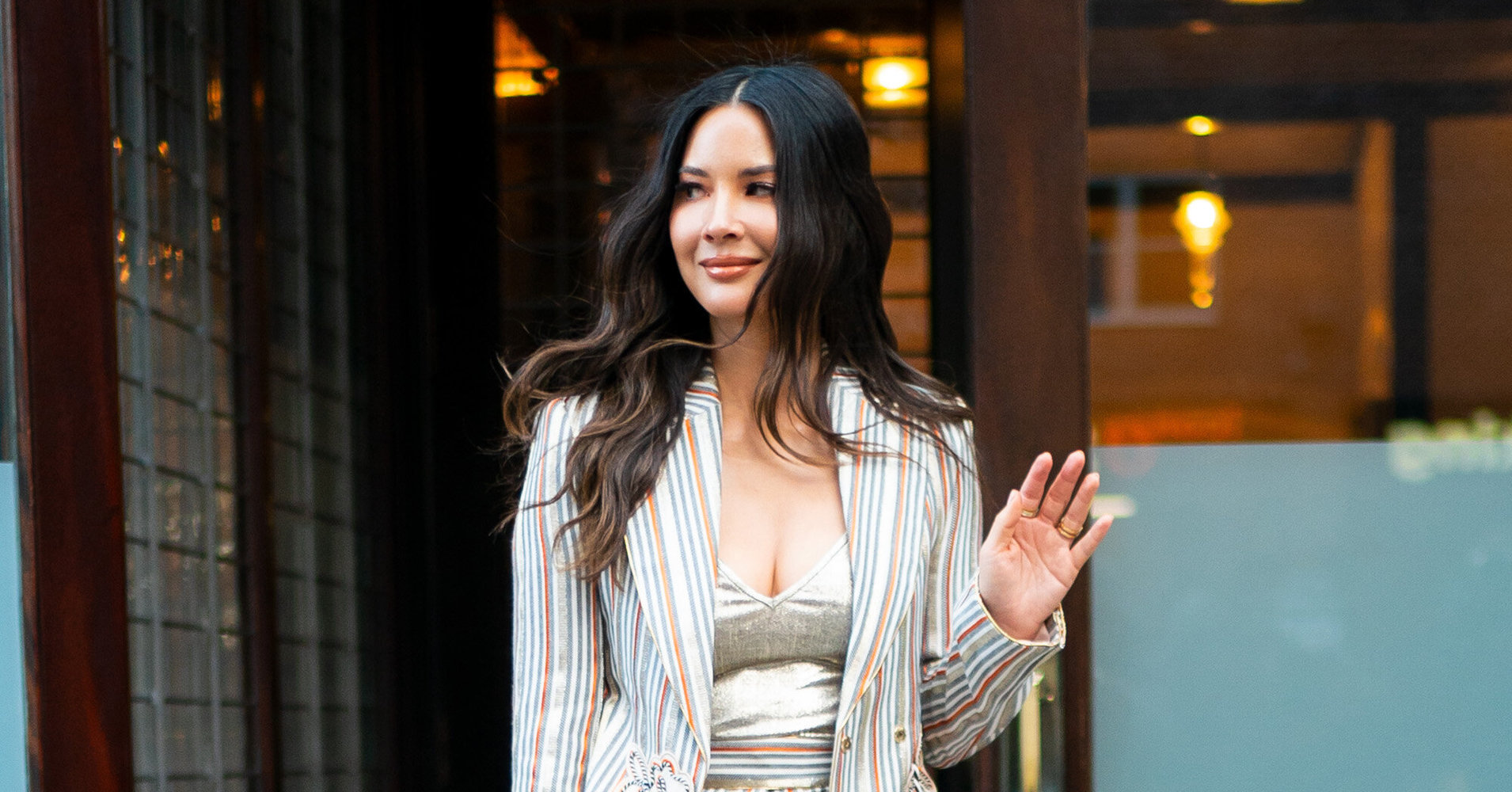[ad_1]
On Thursday, Olivia Munn logged on to Twitter and published an intellectually incoherent, utterly unnecessary short essay. (Stars ― they really are just like us.) The untitled piece took as its subject the fashion blog Go Fug Yourself, a site run by writers Heather Cocks and Jessica Morgan that features brief, snarky critiques of celebrity outfits. A site, Munn argues, that is little more than a brutal appendage of the patriarchy.
One might describe the essay as a work of feminist media criticism, save that she seems to understand neither feminism, nor the media, nor criticism. It’s not entirely clear that she understands essays, either. It is instead a perfect example of something else: the ever-growing power imbalance between rich, famous stars and the precarious population of critics who cover them.
Munn begins by establishing that she accepts her lot as a celebrity: that she must deal not only with fans seeking selfies but also with occasional negative feedback from professional critics who dislike the “subjective work” she has “put out into the public sphere.” “Sidenote,” she adds in an ominous parenthetical: “This doesn’t apply to the select messy journalists who throw out baseless musings as if they’re facts.” Sure! Why would it? Critics are not tabloid reporters, and it isn’t their job to either uncover or make up facts. But this sets up a troubling inconsistency throughout her essay: She’s unclear on the distinctions between subjectivity and objectivity, not to mention between critique and personal attack, and she papers over her elisions and contradictions with self-serving feminist lorem ipsum in order to elicit the sympathy of her followers.
The Fug Girls, Munn argues, do not fall into the categories of “fan” or “legitimate critic” ― they’re something far more pernicious. “These two women run the blog, ‘Go Fug Yourself,’ that rates celebrity fashion by their own personal standards of what’s ‘fugly’ (fucking ugly) and what’s not,” she writes. The “subjectivity” inherent to arts criticism, including fashion criticism, is suddenly a flaw. Though she claims to embrace the role of criticism, here she casts the very fundamentals of the form as illegitimate. What critic could claim to evaluate anything objectively, or by anything other than “personal standards” of quality?
Perhaps Munn should be forgiven for not having a firm grasp on the nuances of journalism. But there’s no excuse for exploiting the cultural ascendancy of feminism to blur the lines between fair criticism and misogyny.
She paints it as a crime against women that her professionally styled outfit, the striped suit pictured above, was described as looking “like she got roped into making a sequel to American Hustle that ended up going straight to on-demand.” (An outfit she wore to receive an award for her charity work! The gall, to focus on her style instead of her moral purity.) It’s a cop-out, an attempt to use her own enormous reach and the rhetoric of pop feminism to skirt valid critique from the less powerful.

Munn goes so far as to link her grievance to the Me Too movement: “If there’s anything we’ve been able to glean from the past two years, it’s that girls and women have been emotionally and physically targeted and abused for years yet have remained silent because collectively we all believed that our voices, our pain, our existence only mattered with conditions attached.”
Using the hard-earned clout of the Me Too movement to deflect critique of the fashion-celebrity industrial complex is not a feminist crusade. The red carpet is a marketing opportunity for both celebrities and the designers they’re wearing; it’s ludicrous to argue that there’s a moral imperative on the part of fashion critics to grease the gears of this sales machine. Munn herself tagged no fewer than five designers, a stylist, a makeup artist, a hairstylist and a nail artist in her Instagram post featuring that striped suit. It’s never been easier for celebrities to monetize their fame by selling clothes and luxury goods to their fans, or to grow their empires by being photographed in covetable items, and in that sense, they’re perfectly happy to have their fashion closely watched. They can try to conscript blogs into aiding their sales mission by keeping things positive, but this isn’t a feminist aim; it’s a capitalist one.
A capitalist aim disguised as a feminist one might be one of the most pure examples of smarm, and Munn’s essay is an exemplar. It uses the righteous social-justice vocabulary developed to describe a pervasive culture of toxic, sexist cruelty to attack a blog that eschews body-shaming in favor of thoughtful critiques of fashion as an art form and as a lucrative industry. She claims to be aware that she’s risking that they will “inevitably spend a large portion of their time retaliating & further smearing [her] name across social media,” but this is hardly the Fug Girls’ approach. Their critiques of Munn have been purely fashion-based, never personal, and they’ve never gone on a smear spree before ― instead, it’s the movie star who is smearing a blog with a fraction of her social media following for daring to respond to her outfits with something less than approval and a “where can I buy this?” When it comes to fashion, she believes everyone should be her publicist.
And here’s the true root of what’s going on with Munn ― and with all the other stars, from Lizzo to Ariana Grande, Justin Bieber to Michael Che, who have taken needless swipes at critics lately: They hold all the cards now.
Remember Phoebe Price? Shauna Sand, perhaps? These women weren’t celebrities, exactly, but a decade ago, they were huge stars to me, thanks to blogs like Go Fug Yourself. In the heyday of celebrity blogging, these sites had the power to make a glorified seat-filler like Price into a figure of importance; they could elevate minor socialites into national names based on the sheer entertainment value of their personal style, and turn actors or singers who failed to present a perfect public image into laughingstocks. “There are a lot of girls who have tons and tons of credits, and no one can get the press that I do,” Price boasted to the New York Post in 2007.
Getting press isn’t what it used to be. Now, celebrity blogs largely exist to boost the real platforms: the stars’ own social media accounts. Headlines coo and applaud over “perfect clapbacks” to “trolls” delivered via Twitter and Instagram. (If not a feminist media critique, Munn’s post fits neatly into the genre of “celeb claps back at trolls.”) A wannabe celeb now is just an influencer, and many of them are wildly successful; if you think of a famous person who doesn’t “have tons and tons of credits,” you’re probably thinking of an Instagram or YouTube star. The conventionally famous also speak directly to millions of fans via social media ― even when they’re featured in glossy mags, they often get to be interviewed (poorly) by friends rather than journalists.
Journalists and bloggers were once gatekeepers who held some real power to make or break celebrities ― which is, perhaps, why celebrities tended to bite their tongue at critique more often. Now stars don’t just have the money and the fame; they have the platforms. Frequently underpaid, disempowered even within a crumbling industry, writers are easy targets. It’s quite likely that far more people will see Munn’s uninformed, misleading attack on GFY than will see any of the pieces in various media outlets debunking it. The star-critic power dynamic has tilted more and more heavily in favor of the famous and wealthy and, like having a private jet, this power has made it harder and harder for them to remember that they are not owed adulation and deference by everyone else.
Sure, anyone can be hurt by a tough critique ― and the tension between critics and artists is age-old. Stars are human too, as evidenced by their propensity toward poorly conceived essays. But it is not everyone’s job to protect their feelings or to push their products. Perhaps they could take a page from Cocks and Morgan, who have responded to Munn’s broadside with grace. In a 2014 interview with Racked, they outlined their philosophy regarding celebs who hate the blog: “We hope they take it in the spirit it’s intended,” said Cocks, “and if they don’t, we can’t control it.”
[ad_2]
Source link

